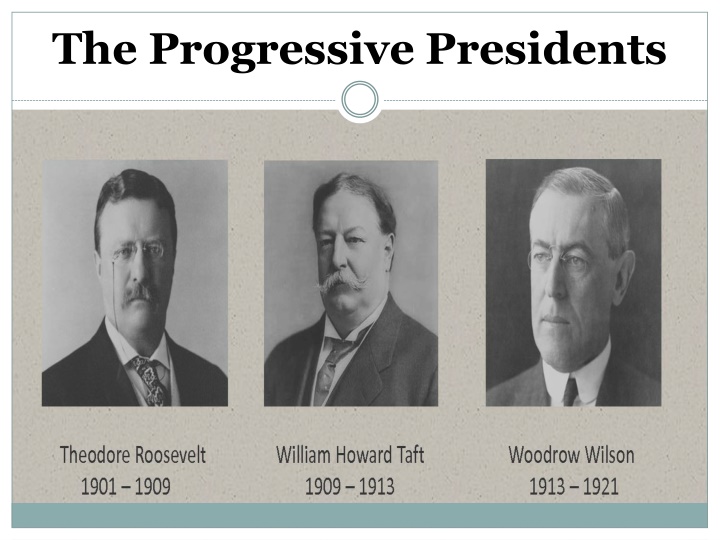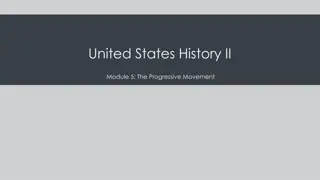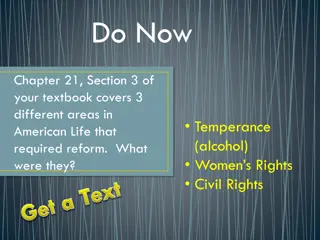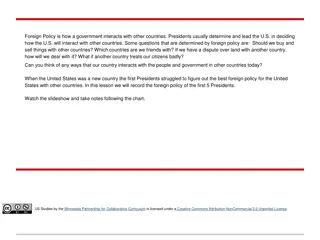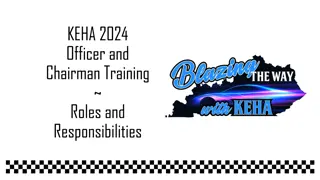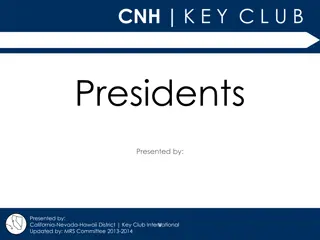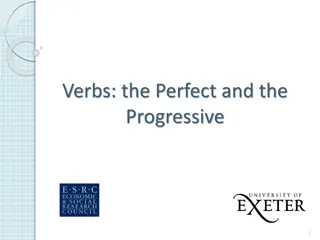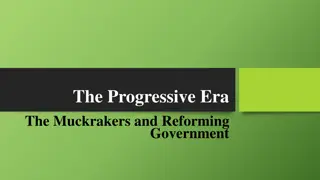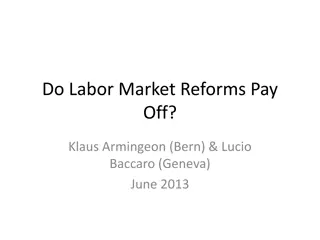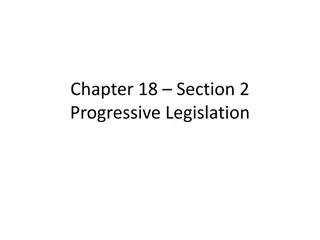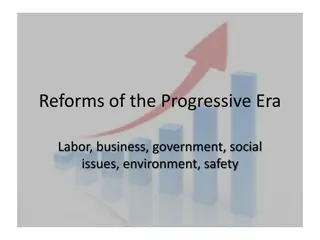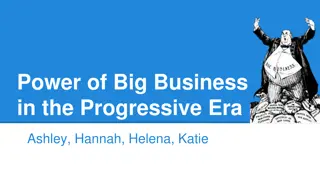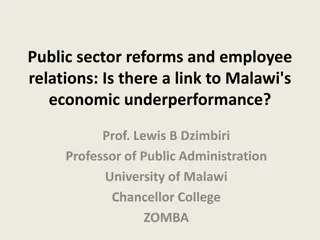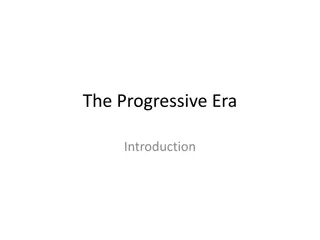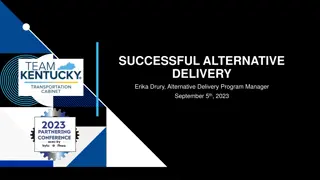Progressive Presidents' Initiatives and Reforms in the US
Explore the impact of Progressive Presidents like Theodore Roosevelt on business regulation, consumer protection, labor conditions, and environmental conservation in the early 20th century. Learn about key laws passed, initiatives taken, and the overall drive towards reform during this period.
Download Presentation

Please find below an Image/Link to download the presentation.
The content on the website is provided AS IS for your information and personal use only. It may not be sold, licensed, or shared on other websites without obtaining consent from the author.If you encounter any issues during the download, it is possible that the publisher has removed the file from their server.
You are allowed to download the files provided on this website for personal or commercial use, subject to the condition that they are used lawfully. All files are the property of their respective owners.
The content on the website is provided AS IS for your information and personal use only. It may not be sold, licensed, or shared on other websites without obtaining consent from the author.
E N D
Presentation Transcript
Learning Objectives 1. Explain how the Progressive Presidents used the power of the presidency to regulate business 2. Analyze laws passed to protect the public and the environment
Terms & Names 1. Conservation the planned management of natural resources 2. Accommodation adapting or making adjustments in order to satisfy someone else 3. NAACP the National Association for the Advancement of Colored People, founded in 1909 to promote full racial equality 4. Bull Moose Party the Progressive Party formed to support Theodore Roosevelt s candidacy for the presidency in 1912
Theodore Roosevelt 1898 - Hero of the Spanish-American War 1899 - 33rdGovernor of New York 1900 - Elected Vice President 1901 - Became 26thPresident when President McKinley was assassinated - Youngest President in U.S. History 1904 - Elected as President - Offered Americans a Square Deal
T. R. Consumer Protection Used presidential power to deal directly with social and economic problems Meat Inspection Act (1906) - gave officials the power to check the quality of meats Pure Food and Drug Act (1906) - banned the manufacture and sale of impure food, drugs and liquors; required correct labeling Created the Food and Drug Administration (FDA) to prevent the sale of dangerous products to the public
T. R. Regulating Business Focused on strengthening regulations and breaking up trusts Hepburn Act (1906) - required railroads to obtain permission from the Interstate Commerce Commission (ICC) before raising rates Regulated good trusts and dissolved bad trusts earning T. R. a reputation as a trust buster
T. R. Regulating Business Formed the Bureau of Corporation to pressure trusts through official investigations and publicity
T. R. Labor Conditions Achieved important reforms in working conditions The Anthracite Coal Strike (1902) - mine owners refused to negotiate with striking workers, T. R. threatened to send troops to take over the mines and arbitrated a deal limiting working hours and raising wages Employers Liability Act (1906) - provided accident insurance for railroad workers
T. R. Conservation Interested in protecting the nation s wilderness lands The National Reclamation Act (1902) - set aside money to build dams and irrigation systems in the West The U.S. Forest Service (1905) - headed by conservationist Gifford Pinchot oversaw the federal protection of 150 million acres of public lands
T. R. Civil Rights Failed to support civil rights for African Americans Booker T. Washington - head of the Tuskegee Institute, an all-black training school, promoted accommodation W. E. B. Du Bois - a founder of the NAACP who demanded for immediate social and economic equality for African Americans Racial equality found little support in the Progressive Movement
William Howard Taft 1901 - Governor-General of the Philippines 1908 - Elected as the 27thPresident - T. R. declined a third term and handpicked Taft to succeed him - Heaviest President in U.S. History 1921 - 10thChief Justice
Taft Reforms Brought twice as many lawsuits against big business as it had under Roosevelt The Mann-Elkins Act (1910) - gave the ICC the power to regulate communication by telephone and telegraph The Sixteenth Amendment (1913) - gave Congress the power to levy an income tax Instituted the 8 hour work day and advocated for mine safety
Taft Problems Split the Republican Party into a Taft faction and a Progressive faction The Payne-Aldrich Act (1909) - Taft wanted to lower tariffs yet praised Congress when it raised tariffs angering Progressives Dismissed Gifford Pinchot Secretary of the Interior Richard A. Ballinger sold several million acres of Alaskan public lands, Pinchot protested and Taft fired him further angering Progressives
Election of 1912 T. R. challenged Taft for the Republican nomination, the nomination went to Taft Supporters of T. R. created a new political party, the Progressive Party or Bull Moose Party Candidates: Republican - William Howard Taft Democratic - Woodrow Wilson Bull Moose - Theodore Roosevelt Socialist - Eugene V. Debs
Woodrow Wilson 1902- 13thPresident of Princeton University 1911 - 34thGovernor of New Jersey 1912 - Elected as the 28thPresident - His platform was the New Freedom - The only President in U.S. History to hold a Ph.D. Dr. President?
Wilson Financial Reforms Aimed for a return to competition in the marketplace with enforcement of antitrust laws The Underwood Tariff Act (1913) - lowered tariffs and provided for a graduated income tax The Federal Reserve Act (1913) created 12 national banks exercising monetary controls Issue currency Control the amount of money in circulation Shift money from one bank to another as needed
Wilson Business Regulation The Federal Trade Commission Act (1914) - aimed to prevent unfair competition; created a commission to investigate such practices as false advertising and mislabeling The Clayton Antitrust Act (1914) - extended the Sherman Antitrust Act (1897) to control business practices that threatened competition
Wilson Other Reforms The Adamson Act (1916) - set an 8 hour day for railroad workers The Federal Farm Loan Act (1916) - made low-interest loans available to farmers Ratification of the Nineteenth Amendment (1920) - gave women the right to vote
One-Word Summaries 1. Write one word that summarizes the lesson s topic. 2. Explain why you chose that word. Example: Regulate. I chose regulate because one of the roles of government is to ensure safe and fair business practices.
